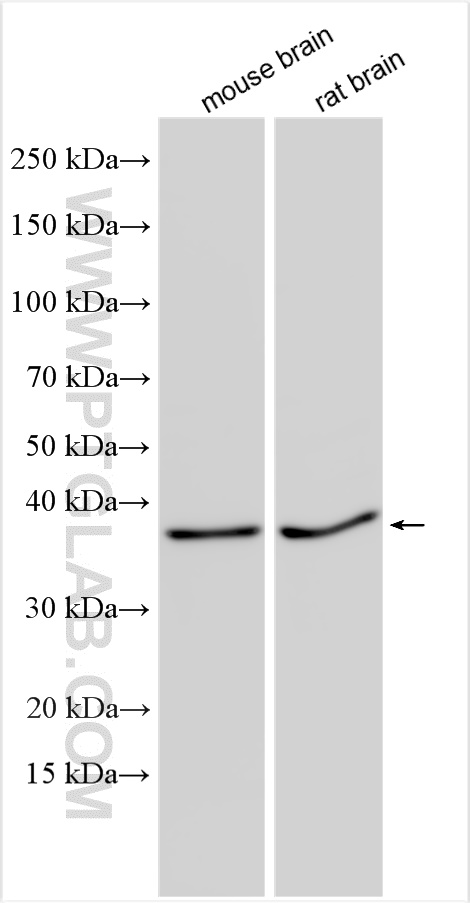验证数据展示
经过测试的应用
| Positive WB detected in | mouse brain tissue, rat brain tissue |
Planning an IHC experiment? We recommend our IHCeasy CCSAP Ready-To-Use IHC Kit. CCSAP primary antibody included.
推荐稀释比
| 应用 | 推荐稀释比 |
|---|---|
| Western Blot (WB) | WB : 1:500-1:2000 |
| It is recommended that this reagent should be titrated in each testing system to obtain optimal results. | |
| Sample-dependent, Check data in validation data gallery. | |
产品信息
28644-1-AP targets CCSAP in WB, ELISA applications and shows reactivity with mouse, rat samples.
| 经测试应用 | WB, ELISA Application Description |
| 经测试反应性 | mouse, rat |
| 免疫原 | CCSAP fusion protein Ag23785 种属同源性预测 |
| 宿主/亚型 | Rabbit / IgG |
| 抗体类别 | Polyclonal |
| 产品类型 | Antibody |
| 全称 | chromosome 1 open reading frame 96 |
| 别名 | C1orf96, CCSAP, Centriole, cilia and spindle-associated protein, CSAP, FLJ37296, FLJ41471 |
| 观测分子量 | 30-36 kDa |
| GenBank蛋白编号 | BC015419 |
| 基因名称 | CCSAP/C1orf96 |
| Gene ID (NCBI) | 126731 |
| RRID | AB_3086074 |
| 偶联类型 | Unconjugated |
| 形式 | Liquid |
| 纯化方式 | Antigen affinity purification |
| UNIPROT ID | Q6IQ19 |
| 储存缓冲液 | PBS with 0.02% sodium azide and 50% glycerol , pH 7.3 |
| 储存条件 | Store at -20°C. Stable for one year after shipment. Aliquoting is unnecessary for -20oC storage. |
背景介绍
CCSAP (Centriole, cilia and spindle-associated protein) colocalizes with polyglutamylated tubulin to centrioles, spindle microtubules, and cilia in human tissue culture cells (PMID: 22493317). Plays a role in microtubule (MT) stabilization and this stabilization involves the maintenance of NUMA1 at the spindle poles. It can be detected as around 30-36 kDa.
实验方案
| Product Specific Protocols | |
|---|---|
| WB protocol for CCSAP antibody 28644-1-AP | Download protocol |
| Standard Protocols | |
|---|---|
| Click here to view our Standard Protocols |
